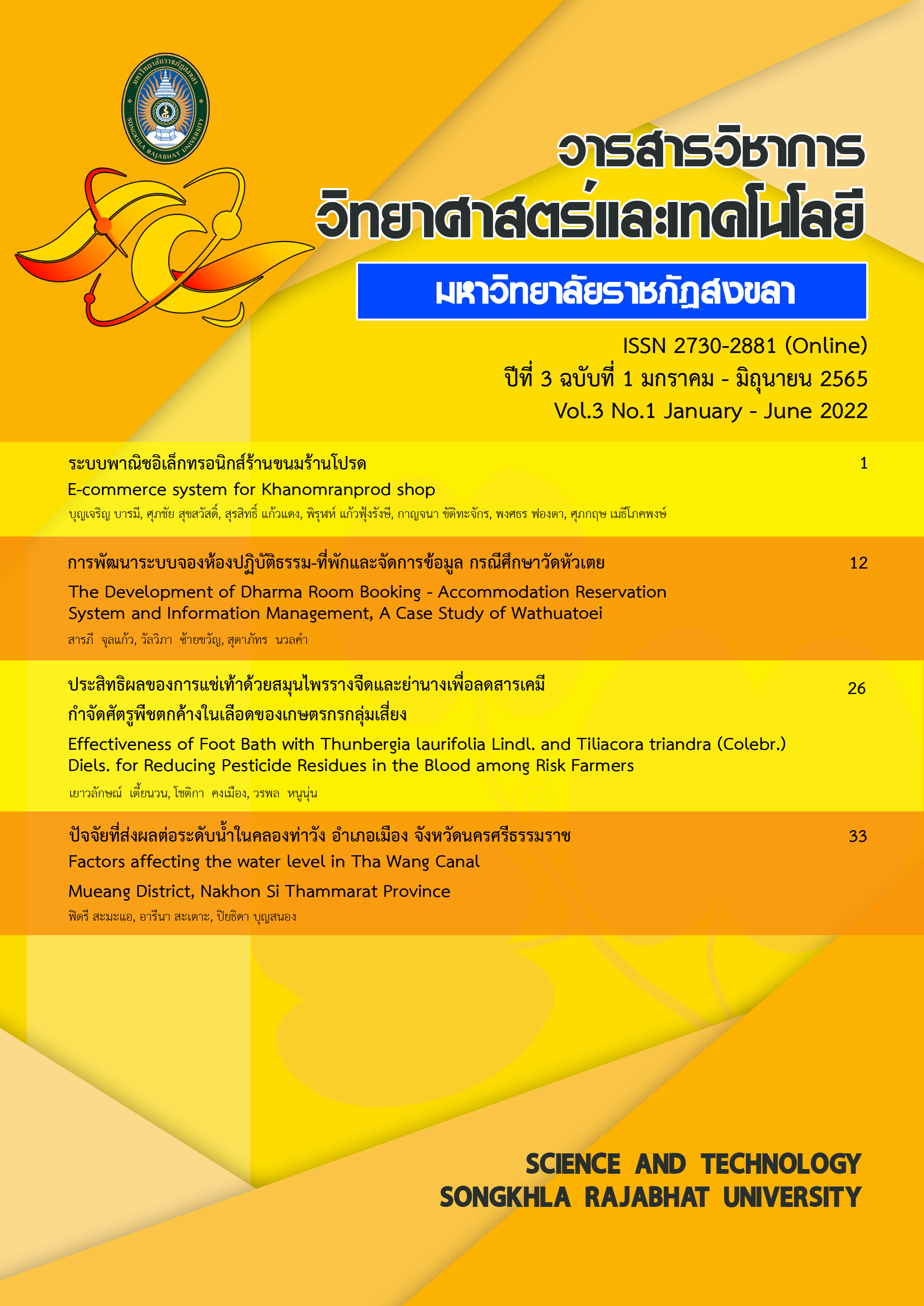The Effectiveness of Foot Bath with Thunbergia laurifolia Lindl. and Tiliacora triandra (Colebr.) Diels. for Reducing Pesticide Residues in the Blood among Risk Farmers
Keywords:
Foot Bath, Thunbergia laurifolia Lindl., Tiliacora triandra (Colebr.) Diels., Pesticide, Risk FarmersAbstract
This quasi-experimental research was on the effectiveness of foot baths with Thunbergia laurifolia Lindl. and Tiliacora triandra (Colebr.) Diels. for reducing pesticide residues in the blood among risk farmers and conducted comparisons of the effectiveness of cholinesterase enzyme reduction between foot baths with Thunbergia laurifolia Lindl. and Tiliacora triandra (Colebr.) Diels. in the blood among 22 persons of risk farmers who are highly exposed to organophosphates and carbamates at risk and unsafe levels. This study was selected by using purposive sampling and simple random sampling for compared two groups (group 1: foot bath with Thumbergia laurifolia Lindl. and group 2: foot bath with Tiliacora triandra (Colebr.) Diels). The sample that a footbath was taken for 15 min a 40-42°C every day for a week. The results revealed that 1) the cholinesterase levels of both groups after finishing the intervention were different significantly (P<0.01). The cholinesterase level of the between foot bath with Thunbergia laurifolia Lindl. and Tiliacora triandra (Colebr.) Diels. after finishing intervention were not different significantly (Z = -1.32, p = 0.187). This finding suggests that the foot-bathing with Thunbergia laurifolia Lindl. Same as a foot bath with Tiliacora triandra (Colebr.) Diels. for reducing pesticide residues in the blood among risk farmers. The research results can be applied to health education and behavior change. However, the altered cholinesterase levels may depend on the duration of the experiment and other factors, so further studies were needed for empirical results. The results of the study may be useful for reducing pesticide residues in the blood among risk farmers and exposure.
References
กองโรคจากการประกอบอาชีพและสิ่งแวดล้อม. (2559). ผลกระทบต่อสุขภาพจากสารเคมีกำจัดศัตรูพืช. สืบค้น 15 กันยายน 2565, จาก http://envocc.ddc.moph.go.th/contents/view/106
จันทพร มณีเสน. (2563). การศึกษาผลของการใช้รางจืดเป็นยาต้านพิษ. วารสารสาธารณสุขและวิทยาศาสตร์สุขภาพ, 3(1), 28-40
นิรมล ธรรมวิริยสติ, วิจิตตรา มาลัยเขต, กลย์รวี กนกเลิศวงศ์, รินรดา วิสุทธิ และสานิตา สิงห์สนั่น. (2562). ระดับเอนไซม์โคลีนเอสเตอเรสในซีรัมต่อผลกระทบสุขภาพของผู้บริโภคผักผลไม้สด. วารสารวิจัยทางวิทยาศาสตร์สุขภาพ, 13(2), 52-62.
พร้อมจิต ศรลัมพ์. (2565). รางจืด สมุนไพรแก้พิษและล้างพิษ. สืบค้น 10 กันยายน 2565, จาก http://medplant.mahidol.ac.th
พิมพ์วิภา แพรกหา (2557). แช่เท้าเพื่อสุขภาพ. สืบค้น 10 กันยายน 2565, จาก https://www.ttmed.psu.ac.th/th/blog/153
รัชฎาภรณ์ จันทสุวรรณ์ และอุไร จเรประพาฬ. (2562). ความสัมพันธ์ระหว่างความรู้ พฤติกรรมการปฏิบัติตนในการป้องกันสารเคมีเข้าสู่ร่างกาย และระดับโคลีนเอสเตอเรสในซีรั่มของเกษตรกร ตำบลเขาพระบาท จังหวัดนครศรีธรรมราช. วารสารคณะพยาบาลศาสตร์ มหาวิทยาลัยบูรพา, 27(1), 68-77.
วัลลภา ลีลานันทกุล, ธนวดี ปกาโส, พัชรมัย ไกรเสน, นายิกา อินทะนาม และวัชราภรณ์ พัทคัน. (2562).
ผลของการแช่เท้าด้วยน้ำรางจืดต่อระดับเอนไซม์โคลีนเอสเตอเรสของเกษตรกรที่สัมผัสสารกลุ่มออร์กาโนฟอสเฟตและกลุ่มคาร์บาเมตในระดับเสี่ยงและไม่ปลอดภัย. ธรรมศาสตร์เวชสาร, 19(พิเศษ), 94-105.
วิโรจน์ เลิศพงศ์พิพัฒน์, ดาริกา ไชยคุณ และโรงพยาบาลซำสูง. (2554). การศึกษาเปรียบเทียบประสิทธิผลในการเพิ่มระดับเอนไซม์โคลีนเอสเตอเรสในกระแสเลือด ระหว่างสมุนไพรรางจืดและย่านางแดงในกลุ่มเกษตรกร. สำนักงานป้องกันควบคุมโรคที่ 6 ขอนแก่น, 18(3), 49-58.
เวทย์ วรวิทย์. (2551). ตำรายาและว่านมงคล ตำรับสำนักเขาอ้อ. กรุงเทพมหานคร: สำนักพิมพ์ ไทยควอลิตี้บุ๊คส์
ศุจิมน มังคลรังสี, สุวพิชญ์ เตชะสาน, วีรยา สินธุกานนท์ และคณะ. (2565). ความชุกของสารเคมีกําจัดศัตรูพืชกลุ่มออการ์โนฟอสเฟตและคาร์บาเมต ตกค้างในผักที่จําหน่ายในตลาดสด และในห้างสรรพสินค้า ในพื้นที่กรุงเทพมหานคร. วารสารวิชาการสาธารณสุขชุมชน, 8(4), 129-140
ศูนย์เทคโนโลยีสารสนเทศและการสื่อสาร กรมวิชาการเกษตร. (2565). ข้อมูลปริมาณและมูลค่า การนำเข้าวัตถุอันตรายทางการเกษตร(รายประเภทการใช้). สืบค้น 1 กันยายน 2565, จาก https://data.go.th/dataset/importchemvol
สำนักการแพทย์ทางเลือก กรมพัฒนาการแพทย์แผนไทยและการแพทย์ทางเลือก. (2553). ตำราวิชาการ การใช้น้ำเพื่อสุขภาพ. พิมพ์ครั้งที่ 2. กรุงเทพมหานคร: สำนักงานกิจการโรงพิมพ์ องค์การสงเคราะห์ทหารผ่านศึก
สำนักโรคจากการประกอบอาชีพและสิ่งแวดล้อม กรมควบคุมโรค กระทรวงสาธารณสุข. (2560). องค์ความรู้เกี่ยวกับการตรวจคัดกรองความเสี่ยงจากการสัมผัสสารเคมีกำจัดศัตรูพืชโดยกระดาษทดสอบโคลีนเอสเตอเรส (Cholinesterase reactive paper) สำหรับเจ้าหน้าที่สาธารณสุขในหน่วยบริการสุขภาพปฐมภูมิ. พิมพ์ครั้งที่ 2. กรุงเทพมหานคร: ศูนย์สื่อและสิ่งพิมพ์แก้วเจ้าจอม มหาวิทยาลัยราชภัฏสวนสุนันทา.
สำนักโรคจากการประกอบอาชีพและสิ่งแวดลอม. (2561). รายงานสถานการณโรคและภัยสุขภาพจากการประกอบอาชีพและสิ่งแวดลอม ป2560. สืบค้น 1 กันยายน 2565, จาก https://ddc.moph.go.th/uploads/ckeditor2//files/01_envocc_situation_60.pdf
องค์การบริหารส่วนตำบลชะมวง. (2565). สภาพและข้อมูลพื้นฐานในเขตพื้นที่ความรับผิดชอบองค์การบริหารส่วนตำบลชะมวง อำเภอควนขนุน จังหวัดพัทลุง. สืบค้น 20 ตุลาคม 2565, จาก https://www.chamung.go.th/index.php
อรุณรัตน ปญจะ กลิ่นเกสร และ ธวัชชัย ดาเชิงเขา. (2563). การเปรียบเทียบประสิทธิผลระหว่างการรับประทานวุ้นรางจืดร่วมกับการอบสมุนไพรกับการรับประทานวุ้นรางจืดในการลดระดับเอนไซมโคลีนเอสเตอเรสในเลือดของเกษตรกรกลุมเสี่ยง. วารสารมหาวิทยาลัยราชภัฏรอยเอ็ด: วิทยาศาสตรและเทคโนโลยี, 1(1), 52-60.
อัญชลี จูฑะพุทธิ. (2553). รางจืด: สมุนไพรล้างพิษ. วารสารการแพทย์แผนไทยและการแพทย์ทางเลือก, 8(2-3), 211-217
Huei-Lin Yang, Xue-Ping Chen, Kwo-Chen Lee, Fuei-Fen Fang and Yann-Fen Chao. (2010). The effects of warm water footbath on relieving fatigue and insomnia of the gynecologic cancer patients on chemotherapy. Cancer Nurs, 33(6):454-60.
Thays Millena Alves Pedroso, Marcelino Benvindo-Souza, Felipe de Araújo Nascimento and et al. (2022). Cancer and occupational exposure to pesticides: a bibliometric study of the past 10 years. Environmental Science and Pollution Research, 29: 17464–17475
Downloads
Published
How to Cite
Issue
Section
License
Copyright (c) 2024 Journal of Science and Technology Songkhla Rajabhat University

This work is licensed under a Creative Commons Attribution-NonCommercial-NoDerivatives 4.0 International License.
Attribution-NonCommercial-NoDerivatives 4.0



